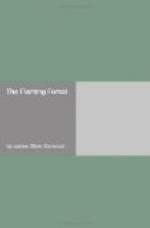His blood tingled. His brain was stirred by a new emotion, a growing thing that made him uneasy and filled him with a strange restlessness. He felt as though he had come suddenly to the edge of a great danger; somewhere within him an intelligence seized upon it and understood. Yet it was not physical enough for him to fight. It was a danger which crept up and about him, something which he could not see or touch and yet which made his heart beat faster and the blood come into his face. It drew him, triumphed over him, dragged his hand forth until his fingers closed upon a lacy, crumpled bit of a handkerchief that lay on the edge of the piano keys. It was the woman’s handkerchief, and like a thief he raised it slowly. It smelled faintly of crushed violets; it was as if she were bending over him in his sickness again, and it was her breath that came to him. He was not thinking of her as St. Pierre’s wife. And then sharply he caught himself and placed the handkerchief back on the piano keys. He tried to laugh at himself, but there was an emptiness where a moment before there had been that thrill of which he was now ashamed.
He turned back to the window. The thunder had come nearer. It was coming up fast out of the west, and with it a darkness that was like the blackness of a pit. A dead stillness was preceding it now, and in that stillness it seemed to Carrigan that he could hear the soapy, slitting sound of the streaming flashes of electrical fire that blazoned the advance of the storm. The camp-fires across the river were dying down. One of them went out as he looked at it, and he stared into the darkness as if trying to pierce distance and gloom to see what sort of a shelter it was that St. Pierre’s wife had over there. And there came over him in these moments a desire that was almost cowardly. It was the desire to escape, to leave behind him the memory of the rock and of St. Pierre’s wife, and to pursue once more his own great adventure, the quest of Black Roger Audemard.
He heard the rain coming. At first the sound of it was like the pattering of ten million tiny feet in dry leaves; then, suddenly, it was like the roar of an avalanche. It was an inundation, and with it came crash after crash of thunder, and the black skies were illumined by an almost uninterrupted glare of lightning. It had been a long time since Carrigan had felt the shock of such a storm. He closed the window to keep the rain out, and after that stood with his face flattened against the glass, staring over the river. The camp-fires were all gone now, blotted out like so many candles snuffed between thumb and forefinger, and he shuddered. No canvas ever made would keep that deluge out. And now there was growing up a wind with it. The tents on the other side would be beaten down like pegged sheets of paper, ripped up and torn to pieces. He imagined St. Pierre’s wife in that tumult and distress —the breath blown out of her, half drowned, blinded by deluge and lightning, broken and beaten because of him. Thought of her companions did not ease his mind. Human hands were entirely inadequate to cope with a storm like this that was rocking the earth about him.




